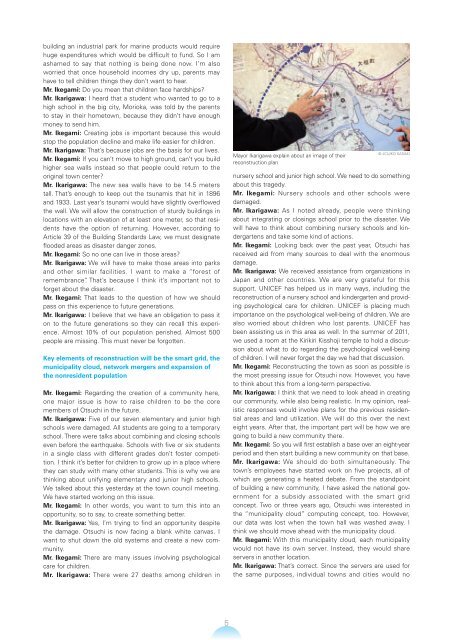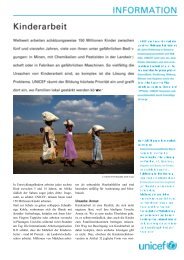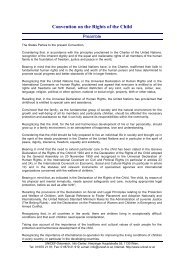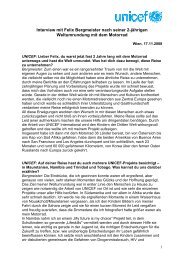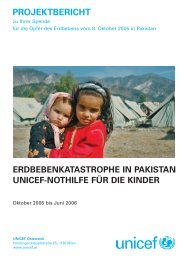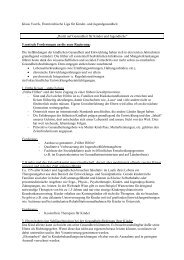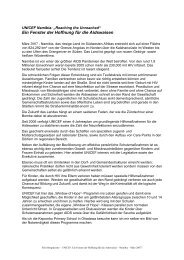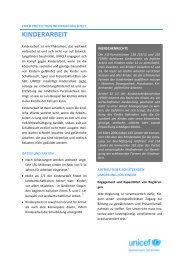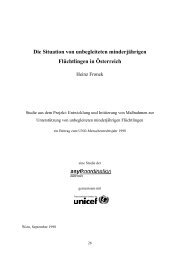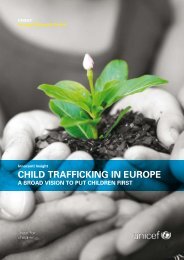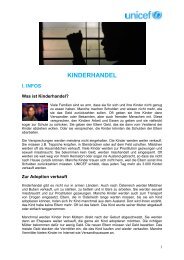Create successful ePaper yourself
Turn your PDF publications into a flip-book with our unique Google optimized e-Paper software.
uilding an industrial park for marine products would require<br />
huge expenditures which would be difficult to fund. So I am<br />
ashamed to say that nothing is being done now. I’m also<br />
worried that once household incomes dry up, parents may<br />
have to tell children things they don’t want to hear.<br />
Mr. Ikegami: Do you mean that children face hardships?<br />
Mr. Ikarigawa: I heard that a student who wanted to go to a<br />
high school in the big city, Morioka, was told by the parents<br />
to stay in their hometown, because they didn’t have enough<br />
money to send him.<br />
Mr. Ikegami: Creating jobs is important because this would<br />
stop the population decline and make life easier for children.<br />
Mr. Ikarigawa: That’s because jobs are the basis for our lives.<br />
Mr. Ikegami: If you can’t move to high ground, can’t you build<br />
higher sea walls instead so that people could return to the<br />
original town center?<br />
Mr. Ikarigawa: The new sea walls have to be 14.5 meters<br />
tall. That’s enough to keep out the tsunamis that hit in 1896<br />
and 1933. Last year’s tsunami would have slightly overflowed<br />
the wall. We will allow the construction of sturdy buildings in<br />
locations with an elevation of at least one meter, so that residents<br />
have the option of returning. However, according to<br />
Article 39 of the Building Standards Law, we must designate<br />
flooded areas as disaster danger zones.<br />
Mr. Ikegami: So no one can live in those areas?<br />
Mr. Ikarigawa: We will have to make those areas into parks<br />
and other similar facilities. I want to make a “forest of<br />
remembrance”. That’s because I think it’s important not to<br />
forget about the disaster.<br />
Mr. Ikegami: That leads to the question of how we should<br />
pass on this experience to future generations.<br />
Mr. Ikarigawa: I believe that we have an obligation to pass it<br />
on to the future generations so they can recall this experience.<br />
Almost 10% of our population perished. Almost 500<br />
people are missing. This must never be forgotten.<br />
Key elements of reconstruction will be the smart grid, the<br />
municipality cloud, network mergers and expansion of<br />
the nonresident population<br />
Mr. Ikegami: Regarding the creation of a community here,<br />
one major issue is how to raise children to be the core<br />
members of Otsuchi in the future.<br />
Mr. Ikarigawa: Five of our seven elementary and junior high<br />
schools were damaged. All students are going to a temporary<br />
school. There were talks about combining and closing schools<br />
even before the earthquake. Schools with five or six students<br />
in a single class with different grades don’t foster competition.<br />
I think it’s better for children to grow up in a place where<br />
they can study with many other students. This is why we are<br />
thinking about unifying elementary and junior high schools.<br />
We talked about this yesterday at the town council meeting.<br />
We have started working on this issue.<br />
Mr. Ikegami: In other words, you want to turn this into an<br />
opportunity, so to say, to create something better.<br />
Mr. Ikarigawa: Yes, I’m trying to find an opportunity despite<br />
the damage. Otsuchi is now facing a blank white canvas. I<br />
want to shut down the old systems and create a new community.<br />
Mr. Ikegami: There are many issues involving psychological<br />
care for children.<br />
Mr. Ikarigawa: There were 27 deaths among children in<br />
5<br />
Mayor Ikarigawa explain about an image of their<br />
reconstruction plan<br />
© JCU/KO SASAKI<br />
nursery school and junior high school. We need to do something<br />
about this tragedy.<br />
Mr. Ikegami: Nursery schools and other schools were<br />
damaged.<br />
Mr. Ikarigawa: As I noted already, people were thinking<br />
about integrating or closings school prior to the disaster. We<br />
will have to think about combining nursery schools and kindergartens<br />
and take some kind of actions.<br />
Mr. Ikegami: Looking back over the past year, Otsuchi has<br />
received aid from many sources to deal with the enormous<br />
damage.<br />
Mr. Ikarigawa: We received assistance from organizations in<br />
Japan and other countries. We are very grateful for this<br />
support. UNICEF has helped us in many ways, including the<br />
reconstruction of a nursery school and kindergarten and providing<br />
psychological care for children. UNICEF is placing much<br />
importance on the psychological well-being of children. We are<br />
also worried about children who lost parents. UNICEF has<br />
been assisting us in this area as well. In the summer of 2011,<br />
we used a room at the Kirikiri Kisshoji temple to hold a discussion<br />
about what to do regarding the psychological well-being<br />
of children. I will never forget the day we had that discussion.<br />
Mr. Ikegami: Reconstructing the town as soon as possible is<br />
the most pressing issue for Otsuchi now. However, you have<br />
to think about this from a long-term perspective.<br />
Mr. Ikarigawa: I think that we need to look ahead in creating<br />
our community, while also being realistic. In my opinion, realistic<br />
responses would involve plans for the previous residential<br />
areas and land utilization. We will do this over the next<br />
eight years. After that, the important part will be how we are<br />
going to build a new community there.<br />
Mr. Ikegami: So you will first establish a base over an eight-year<br />
period and then start building a new community on that base.<br />
Mr. Ikarigawa: We should do both simultaneously. The<br />
town’s employees have started work on five projects, all of<br />
which are generating a heated debate. From the standpoint<br />
of building a new community, I have asked the national government<br />
for a subsidy associated with the smart grid<br />
concept. Two or three years ago, Otsuchi was interested in<br />
the “municipality cloud” computing concept, too. However,<br />
our data was lost when the town hall was washed away. I<br />
think we should move ahead with the municipality cloud.<br />
Mr. Ikegami: With this municipality cloud, each municipality<br />
would not have its own server. Instead, they would share<br />
servers in another location.<br />
Mr. Ikarigawa: That’s correct. Since the servers are used for<br />
the same purposes, individual towns and cities would no


